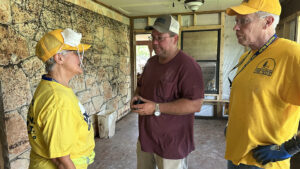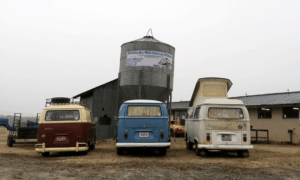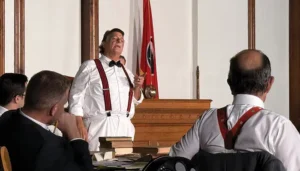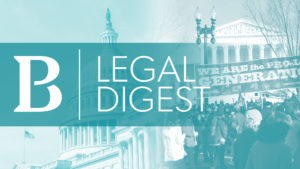
VANCOUVER, British Columbia (BP)–“We do the only thing we know to do; we pray and take it one step at a time,” says Jerry Conner, pastor of The Bridge, a new Southern Baptist congregation in Vancouver’s trendy Kitsilano neighborhood.
After three years of planting a church in Kitsilano, nearly 50 people participate in Sunday morning worship, which takes place in what Conner says might be the most beautiful sanctuary in the world — “the planetarium,” though officially it is the Vancouver Museum and Space Center.
One wall of the room used by the church is all glass; the view is of Vancouver’s downtown high-rises flanked by the North Shore Mountains and girdled by the waters of English Bay.
“It is absolutely breathtaking,” Conner said. “One week I was preaching on God’s sovereignty and a bald eagle flew down in front of the windows.”
The Bridge was stop No. 54 Oct. 5 on SBC President Bobby Welch’s bus tour of Southern Baptist churches across the nation.
“This is an extremely urban environment –- one of the highest population densities in North America, unlike anything most people have ever experienced,” Conner said of Vancouver. “In our church we have eight [members who own] vehicles. That has huge implications on how you do ministry, how you get around, how you live.”
In the 1960s and ’70s, Kitsilano was the hub of Vancouver’s counterculture. The international environmental group Greenpeace was started in Kitsilano.
“It’s very trendy, very liberal, very New Age, very environmental and very popular,” Conner said. “About 34,000 people live in Kitsilano; 54 percent are between 25 and 40, so it’s very young, and only 2 percent of the population attend worship services of any kind, Catholic or anything else.”
Vancouver as a whole is a model of urban development around the world because, more than growing, it’s actually thriving on that growth, the pastor said. About 60,000 people live in the downtown area and additional high-rises are being built as fast as contractors can finish them.
“They expect to double the population in 10 years,” Conner said. “But in all that development, there’s no allowance for sacred space. It’s absolutely beautiful, stunningly beautiful, and very desirable for people to live and congregate, but it’s a secular city.”
Canadian statistics report that 43 percent of the people in Vancouver say they have “no religion,” the pastor said.
Long before he thought of Vancouver for a church plant, Conner said, he felt God leading him to just such a place.
He worked in the business world for 18 years and helped plant River Community Church in Wichita, Kan., before going to Southwestern Baptist Theological Seminary in Texas with a calling to church planting.
One day, when studying in the Book of Ezekiel, “I sensed God saying, ‘I have something for you; I want you to go to the beginning of this book,’” Conner recounted. “By the third chapter I was on my knees in tears. I saw God saying, ‘I am calling you to hardhearted Israelites.’”
He understood that to mean that he and his family would be planting a church in the United States but two weeks later in a conversation, a professor encouraged him to consider Vancouver.
The Conner family arrived in August 2000, started the first Bible study in their home in January 2001 and the first worship service that September.
“I prayed in a number of areas around the city about where to start a church, and I consistently was drawn back to this area,” Conner said. “It’s kind of a yuppie area, and I was in that framework in my other life, before I went to seminary. And this is the very heartbeat of Vancouver. I think that’s where God wanted to take us. He wants to reach people in the very heart and center of the city.”
People tried to dissuade them, and the challenges have been formidable, Conner said, but God is sovereign.
“We have a baby boomer generation that has completely rejected and walked away from Christianity and the church, and they have adamantly walked away,” Conner said. “Another thing is being an American. It’s not easy being an American outside of America today, especially if you’re trying to tell them you have an answer that will help them in their lives. That’s a challenge.
“Other challenges — secularism is deeply ingrained in the culture; New Age is deeply ingrained,” the pastor said. “Materialism is rampant. This is a very affluent area, and leisure is a huge challenge for us as well. It’s one of the gods of the area. People love to play. And individualism is rampant.”
But along with challenges come opportunities, such as a sports camp for soccer and basketball this summer that drew 29 youngsters, all from unchurched homes but the pastor’s daughter. Missions teams from River Community Church in Wichita, Kan., and First Baptist Church in Garland, Texas, helped lead the camps.
“The kids asked why we were there, and that provided opportunities for us to tell them [that] God brought us there to be able to communicate to them the love He has for them,” Conner said. “We had six children express an interest in knowing Jesus -– … that was phenomenal.
“Now we’re attempting to build relationships with these kids and their families,” the pastor continued. “It’s a challenge because parents don’t have much of a need for church, but I think there are some opportunities because they know they have some needs in raising their children.”
At the end of the sports camp was an awards ceremony during which each child received recognition for some aspect of their character.
“For most of the kids, they don’t often receive public affirmation, and the parents always are encouraged to hear someone speak well of their children,” Conner said. “One of the mothers came up to us and said, ‘Somehow you have captured the heart of my daughter.’ It was a phenomenal experience.
“But we’ve recognized the stark reality that this is a long-term commitment on our part,” the pastor said. “None of the kids has come to church yet.”
Another reality is that people don’t generally trust one another, so trust-building is an essential component of the foundation for The Bridge, Conner said.
“While we recognize the work has been slower than we would like, God is making significant changes in people’s lives,” the pastor said. “A friend who visited recently said, ‘While you may not have many, what you have is much.’”
–30–















